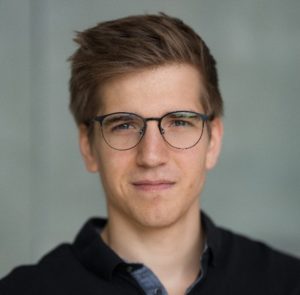 |
Alex studied chemistry at the University of Heidelberg (B. Sc. 2015) and the University of Cambridge (M. Phil. 2016). As a Cambridge Trust Vice Chancellor scholar, he studied the supramolecular realm of main group chemistry under the supervision of Prof. D. S. Wright and received his PhD in 2020. After post-doctoral research supported by a Royal Commission for the Exhibition of 1851 research fellowship at the University of Oxford, he started his independent career at the Free University of Berlin in the fall of 2021 as a Liebig fellow. In 2024 he will move to the University of Bayreuth to take up an appointment as a tenure track Junior Professor. His work is concerned with the development of synthetic methodologies for new functional and degradable polymer backbones. Find out more about his work on Twitter/X @AJPlajer or on www.agplajer.com. |
Read Alex’s open access Emerging Investigator article, Ring-opening terpolymerisation of phthalic thioanhydride with carbon dioxide and epoxides, DOI D3PY01022H.
Read our interview with Alex below:
How do you feel about Polymer Chemistry as a place to publish research on this topic?
Polymer Chemistry really stands out as a platform for publishing our research. One of its notable strengths lies in its expeditious publication process, ensuring that our findings reach the scientific community in a timely manner, which is vital for a young research group given the various age deadlines we face. We also found that having scientific editors who are experts in the field contributes to the peer-review process as they also make valuable scientific suggestions and never fail to pick reviewers that teach us how to improve the quality of our work.
What aspect of your work are you most excited about at the moment and what do you find most challenging about your research?
As a synthetic inorganic chemist by training who didn’t know what a DSC was until the last months of his Postdoc, I find great excitement in delving into the material properties of the polymers we prepare. It’s particularly intriguing to investigate how these properties evolve when transitioning to polymers incorporating heavier elements like sulfur offering a fresh perspective on the potential applications of our creations.
One of the hurdles I face as a young Principal Investigator is not doing much experimental work anymore. Nonetheless, I remain optimistic about the possibility of returning to the fume hood in the future (or as we say in German: “Die Hoffnung stirbt zuletzt”)!
Can you share one piece of career-related advice or wisdom with other early career scientists?
To be open to accept help and advice from everyone.
To find out more about his work, follow Alex on on Twitter/X @AJPlajer or check out his lab’s web page.










